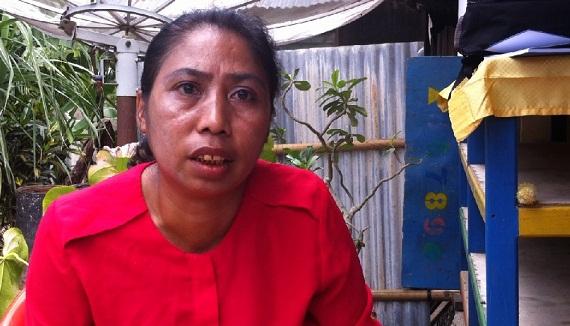HEADLINE
Women strike back against domestic violence in Indonesia
"Known as ‘Belis’ in eastern Indonesia, the dowry tradition has long been linked to violence against women. "
Quinawaty Pasaribu KBR

Known as ‘Belis’ in eastern Indonesia, the dowry tradition has long been linked to violence against women.
In the community of Tunbakun in East Nusa Tenggara, there were 79 reported cases of domestic violence last year, but not one was followed up by authorities.
Reporter Quinawaty Pasaribu traveled to the country’s east to meet one victim turned paralegal, who is fighting against injustice against women in the community.
It’s early morning here in Tunbakun, a small community on the island of Timor, in East Nusa Tenggara.
A group of mothers have brought their children to playgroup.
It’s a simple preschool inside a wooden house with a ground floor.
The children are lining up while singing.
Education levels are low in this region of Indonesia, especially for girls. In a male dominated society, the education of women is not a priority.
Here it is also the dowry tradition that sees many women locked into the patriarchal system.
To marry, a groom must pay a dowry, known here as ‘belis’.
Anton Evi, the chief executive of the Yabiku Foundation, which focuses on women’s empowerment, explains how the dowry system works.
Like when he got married to his wife, Frida.
“When I wanted to get married to Frida, I prepared the dowry, which included buffalo, cows, coins with the picture of Queen Elizabeth, and necklaces of a certain length,” he explains, “The price is different for each status level. But now it has shifted because some of the things are difficult to find.”
The dowry is seen not just as an economic commodity but a symbol of a bond between two families.
The average rate of a dowry is about 1,250 US dollars.
But the problem is that the tradition sometimes leads men treating their wives like possessions.
Yanena Ole explains what happened to her.
“I married my husband on April 29, in the year 2000,” says Ole, “Initially we are doing well, but in 2010, the marriage started to go bad. Probably because there was a third person... I do not know. My husband started to deny my rights as a wife. He began decreasing the money given to me and when I asked about it we would always fight.”
Yanena’s husband was also physically abusive.
But police have not followed up any of the reports she has made.
“He was physically violent and I went to the police office and made a statement,” she says, “I made reports against him four times. The first report about physical violence happened in 2008/2009. The latest was in August 2015, when he was verbally abusive and I reported it to the police.”
Knowing what she was going through, Yanena’s friend Susana Naisoko, or Santri, asked her to join Yabiku.
Santri asked her to join the foundation for women’s rights as a paralegal and offered to help Yanena deal with her domestic violence cases.
The group successfully supported meditation between her and husband.
“When I shared my problem with the group, they suggested that I make a report because women have dignity,” explains Ole, “Santri assisted me at the police and finally we made peace.”
For the past year Yanena has been working as a paralegal, raising awareness about victims of domestic violence in Tunbakun.
Reminding women they have equal rights and if they face violence at home it has to be reported.
While her case is not expected to be heard in court any time soon, Yanena has helped changed the perception of abuse against women in the community – fighting for their dignity and rights.
- eng
- Quinawaty Pasaribu KBR
- belis tradition
- dowry tradition Nusa Tenggara Timur
- International woman day
- Indonesia women paralegal
- yabiku Foundation
Komentar (0)
KBR percaya pembaca situs ini adalah orang-orang yang cerdas dan terpelajar. Karena itu mari kita gunakan kata-kata yang santun di dalam kolom komentar ini. Kalimat yang sopan, menjauhi prasangka SARA (suku, agama, ras dan antargolongan), pasti akan lebih didengar. Yuk, kita praktikkan!